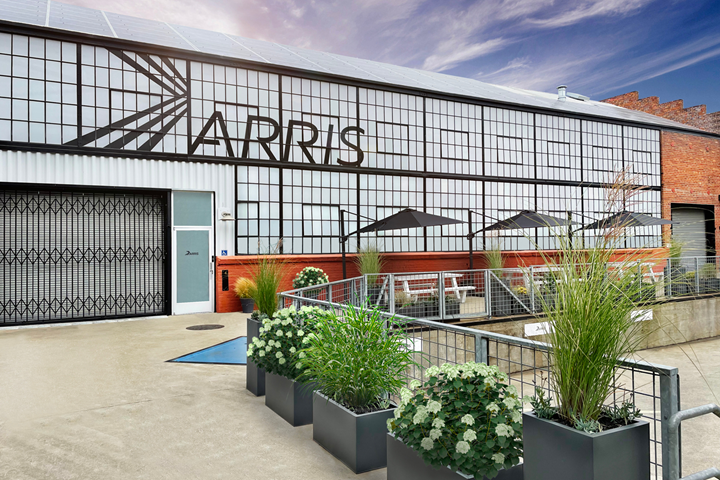Arris raises additional $88.5 million in funding, receives new investment by Chuo Malleable Iron
Arris continues to scale up global operations of its Additive Molding technology and partner across industries to fulfill an increasing demand for medium- to high-volume composites production.

Photo Credit, all images: Arris
Arris (Berkeley, Calif., U.S.), an advanced manufacturer enabling the use of high-performance composites with new design latitudes for mass-market consumer products, transportation and industrial applications, announced that it has raised $88.5 million in Series C funding. Led by XN, the round saw participation from new and returning investors, including Modern Venture Partners, New Enterprise Associates (NEA), Taiwania Capital, Bosch, Valo Ventures and Alumni Ventures Group.
The latest funding will be used to further scale the company’s global operations to fulfill an increasing demand for medium- to high-volume production of products requiring Arris’ design and manufacturing capabilities, including its Additive Molding technology. Arris has now raised $147 million to date, which includes support from strategic investors across the global manufacturing space, such as Standard Industries, Chuo Malleable Iron and an undisclosed portable electronics company, in addition to Bosch.
“Arris’ Additive Molding technology is transforming how next-generation products are made, enabling significant commercial and sustainability improvements across many of our most critical industries,” says Gaurav Kapadia, founder of XN. “We are excited to partner with Ethan, Riley and the entire Arris team as they dramatically expand the use of high-performance composite materials throughout the global economy.”
This sentiment is also shared with Chuo Malleable Iron (Aichi, Japan) which, as of Nov. 4, invested in Arris Composites. Chuo believes the company’s advanced manufacturing technology — enabling significant weight reductions through part consolidation, topology optimization and aligned continuous carbon fiber composite structures — offers a new business option for various applications, including Chuo’s core business in automotive parts. Chuo will continue to explore the opportunity to collaborate with Arris in the Japanese market, and further details will be announced later.
“We feel that the 3D-aligned continuous fiber technology by Arris, which enables new design latitudes with lightweight and high-strength products at scale, will drive meaningful results across industries including automotive,” adds the CEO of Chuo Katan. “We intend to deepen our discussions and will thoroughly consider the opportunities ahead using this advanced technology.”
Ongoing developments
Founded in 2017, Arris reportedly pioneered the development of a patented end-to-end automated manufacturing technology that the company says combines the best of advanced composites, additive and high-volume manufacturing methods to enable design latitudes not previously possible in mass-produced products.

Arris Taiwan production facility.
In 2020, Arris expanded its R&D facility in Berkeley, Calif., to include a dedicated new product introduction center for customers and U.S.-based production capacity. The Arris Taiwan production facility broke ground in 2020 and has nearly 45,000 square feet of additional capacity to serve key portable electronics customers who require product assembly overseas.
“Our company is at an inflection point with U.S. manufacturing in full swing, a new mass-production facility overseas and customers winning design awards and receiving industry-wide recognition for their Arris-enabled products. The XN team possesses deep knowledge of how to scale durable businesses and is the ideal partner to help Arris achieve its next level of growth,” says Ethan Escowitz, CEO and founder at Arris.
Arris serves customers across the consumer products and sports, consumer electronics, aerospace, drone, government, industrial and automotive industries. Recent partnerships include:
- Use of Arris parts for unmanned aerial vehicle (UAV) manufacturer Skydio’s (Redwood City, Calif., U.S.) X2 drone.
- The U.S. Army’s Combat Capabilities Development Command Ground Vehicle Systems Center’s (DEVCOM GVSC) partnership with Arris to demonstrate significant vehicle weight reductions through part consolidation, topology optimization and an aligned continuous carbon fiber composite structure. The project is contracted through LIFT (Detroit, Mich., U.S.).
- A research project with Airbus (Toulouse, France) focused on the production of cabin brackets. The project aims to demonstrate significant reductions in aviation emissions by leveraging innovative manufacturing methods and materials, including composites.
Arris was also ranked as one of Fast Company’s “10 Most Innovative Manufacturers of 2021.” Additional recognitions include East Bay EDA’s 2021 Innovation Award in Advanced Manufacturing, the Business Intelligence Group’s 2021 BIG Innovation Annual Award, the Chicago Athenaeum’s GOOD DESIGN Award for 2021 and Red Dot’s 2020 Design Concept Award.
“We’re working with some of the most recognizable brands across industries to solve the hardest product engineering challenges that demand a new level of performance and design capabilities,” says Riley Reese, CTO and co-founder at Arris. “This next phase at Arris will broaden access to our design and manufacturing tools as we continue to expand the partnerships we have with the world’s most innovative companies.”
Read Next
Plant tour: Daher Shap’in TechCenter and composites production plant, Saint-Aignan-de-Grandlieu, France
Co-located R&D and production advance OOA thermosets, thermoplastics, welding, recycling and digital technologies for faster processing and certification of lighter, more sustainable composites.
Read MoreDeveloping bonded composite repair for ships, offshore units
Bureau Veritas and industry partners issue guidelines and pave the way for certification via StrengthBond Offshore project.
Read MoreAll-recycled, needle-punched nonwoven CFRP slashes carbon footprint of Formula 2 seat
Dallara and Tenowo collaborate to produce a race-ready Formula 2 seat using recycled carbon fiber, reducing CO2 emissions by 97.5% compared to virgin materials.
Read More





















